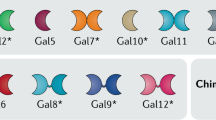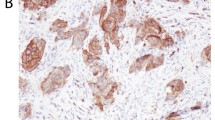Abstract
Galectin-3 belongs to a family of carbohydrate-binding proteins whose function is not fully characterized. However, it is believed to play a role in adhesion, proliferation and apoptosis in solid tumors. We aimed at investigating galectin-3 expression in bladder cancer. Galectin-3 expression was assessed by transcript profiling (U133A arrays) in a series or frozen bladder tumors (n = 105). Immunohistochemistry was performed on tissue arrays containing bladder tumors (n = 389) to evaluate associations of protein expression patterns of galectin-3 with proliferation (Ki67), apoptosis (apopdetek), bcl-2, and clinicopathologic variables. Galectin-3 protein levels were then quantified in 160 urinary specimens of bladder cancer patients and controls by enzymeimmunoanalysis. Galectin-3 gene expression levels increased in invasive tumours as compared with non-muscle invasive lesions (p = 0.001) and were associated with poor survival in patients with advanced disease (p = 0.03). Protein expression patterns also correlated galectin-3 with tumor stage (p < 0.001), grade (p = 0.03), Ki67 and apopdetek (p < 0.001), and overall survival in patients with T1G3 tumors (p < 0.001). Furthermore, galectin-3 urinary levels segregated bladder cancer patients from controls with high diagnostic accuracy (AUC = 0.7). Independent series of bladder tumors showed that transcript and protein levels of galectin-3 were differentially expressed along bladder cancer progression. Urinary protein levels served to identify bladder cancer patients. These observations suggest a role for galectin-3 as a biomarker for bladder cancer diagnostics, staging, and outcome prognosis.





Similar content being viewed by others
References
Jemal A, Siegel R, Ward E, et al. Cancer statistics, 2009. CA Cancer J Clin. 2009;59:225–49.
Sanchez-Carbayo M, Cordon-Cardo C. Molecular alterations associated with bladder cancer progression. Semin Oncol. 2007;34:75–84.
Barondes SH, Cooper DN, Gitt MA, Leffler H. Galectins. Structure and function of a large family of animal lectins. J Biol Chem. 1994;269:20807–10.
Perillo NL, Marcus ME, Baum LG. Galectins: versatile modulators of cell adhesion, cell proliferation, and cell death. J Mol Med. 1998;76:402–12.
Danguy A, Camby I, Kiss R. Galectins and cancer. Biochim Biophys Acta. 2002;19(1572):285–93.
Hughes RC. Galectins as modulators of cell adhesion. Biochimie. 2001;83:667–76.
Hsu DK, Yang R, Liu F. Galectins in apoptosis. Methods Enzymol. 2006;417:256–73.
Nakahara S, Raz A. On the role of galectins in signal transduction. Methods Enzymol. 2006;417:273–89.
Cindolo L, Benvenuto G, Salvatore P, et al. Galectin-1 and galectin-3 expression in human bladder Transitional Cell Carcinomas. Int J Cancer. 1999;84:39–43.
Bigotti G, Coli A, Prisco LA, Spina C, Russo F, Castri F, et al. Rare presentation of carcinosarcoma arising in bladder diverticulum. J Exp Clin Cancer Res. 2001;20:301–4.
Oka N, Nakahara S, Takenaka Y, Fukumori T, Hogan V, Kanayama HO, et al. Galectin-3 inhibits tumor necrosis factor-related apoptosis-inducing ligand-induced apoptosis by activating Akt in human bladder carcinoma cells. Cancer Res. 2005;65:7546–53.
Langbein S, Lehmann J, Harder A, Steidler A, Michel MS, Alken P, et al. Protein profiling of bladder cancer using the 2D-PAGE and SELDI-TOF-MS technique. Technol Cancer Res Treat. 2006;5:67–72.
Kramer MW, Kuczyk MA, Hennenlotter J, et al. Decreased expression of galectin-3 predicts tumour recurrence in pTa bladder cancer. Oncol Rep. 2008;20:1403–8.
Sanchez-Carbayo M, Socci ND, Lozano J, Saint F, Cordon-Cardo C. Defining molecular profiles of poor outcome in patients with invasive bladder cancer using oligonucleotide microarrays. J Clin Oncol. 2006;24:778–89.
Dawson-Saunders B, Trapp RG. Basic and clinical biostatistics. 2nd ed. Norwalk, Connecticut: Appleton & Lange; 1994.
Lahm H, Andre S, Hoeflich A, et al. Comprehensive galectin fingerprinting in a panel of 61 human tumor cell lines by RT-PCR and its implications for diagnostic and therapeutic procedures. J Cancer Res Clin Oncol. 2001;127:375–86.
Yamaoka K, Mishima K, Nagashima Y, Aai A, Sanai Y, Kirino T. Expression of galectin-1 mRNA correlates with the malignant potential of human gliomas and expression of antisense galectin-1 inhibits the growth of 9 glioma cells. J Neurosci Res. 2000;59:722–30.
Jung EJ, Moon HG, Cho BI, et al. Galectin-1 expression in cancer-associated stromal cells correlates tumor invasiveness and tumor progression in breast cancer. Int J Cancer. 2007, 120:2331–8
Liu FT, Rabinovich GA. Galectins as modulators of tumour progression. Nat Rev Cancer. 2005;5:29–41.
Oka N, Takenaka Y, Raz A. Galectins and urological cancer. J Cell Biochem. 2004;91:118–24.
Hughes RC. Secretion of the galectin family of mammalian carbohydrate-binding proteins. Biochim Biophys Acta. 1999;1473:172–85.
Raz A, Zhu DG, Hogan V, et al. Evidence for the role of 34-kDa galactoside-binding lectin in transformation and metastasis. Int J Cancer. 1990;46:871–77.
Nakamura M, Inufusa H, Adachi T, et al. Involvement of galectin-3 expression in colorectal cancer progression and metastasis. Int J Oncol. 1999;15:143–48.
Schoeppner HL, Raz A, Ho SB, Bresalier RS. Expression of an endogenous galactose-binding lectin correlates with neoplastic progression in the colon. Cancer. 1995;75:2818–26.
Inohara H, Honjo Y, Yoshii T, et al. Expression of galectin-3 in fine-needle aspirates as a diagnostic marker differentiating benign from malignant thyroid neoplasms. Cancer. 1998;5:2475–84.
Yoshimura A, Gemma A, Hosoya Y, et al. Increased expression of the LGALS3 (galectin 3) gene in human non-small-cell lung cancer. Genes Chromosomes Cancer. 2003;37:159–64.
Castronovo V, Van Den Brule FA, Jackers P, et al. Decreased expression of galectin-3 is associated with progression of human breast cancer. J Pathol. 1996;179:43–8.
Idikio H. Galectin-3 expression in human breast carcinoma: correlation with cancer histologic grade. Int J Oncol. 1998;12:1287–90.
Okada K, Shimura T, Suehiro T, Mochiki E, Kuwano H. Reduced galectin-3 expression is an indicator of unfavorable prognosis in gastric cancer. Anticancer Res. 2006;26:1369–76.
Califice S, Castronovo V, Van den Brole F. Galectin-3 and cancer. Int J Oncol. 2004;25:983–92.
Van Den Brule FA, Waltregny D, Liu FT, Castronovo V. Alteration of the cytoplasmic/nuclear expression pattern of galectin-3 correlates with prostate carcinoma progression. Int J Cancer. 2000;89:361–67.
Schwarz Jr G, Remmelink M, Decaestecker C, et al. Galectin fingerprinting in tumor diagnosis. Differential expression of galectin-3 and galectin-3 binding sites, but not galectin-1, in benign vs malignant uterine smooth muscle tumors. Am J Clin Pathol. 1999;111:623–31.
Bergero N, De Pompa R, Sacerdote C, et al. Galectin-3 expression in parathyroid carcinoma: immunohistochemical study of 26 cases. Hum Pathol. 2005;36:908–14.
Yang RY, Hsu DK, Liu FT. Expression of galectin-3 modulates T-cell growth and apoptosis. Proc Natl Acad Sci U S A. 1996;93:6737–42.
Nakahara S, Oka N, Raz A. On the role of galectin-3 in cancer apoptosis. Apoptosis. 2005;10:267–75.
Fukumori T, Oka N, Takenaka Y, et al. Galectin-3 regulates mitochondrial stability and antiapoptotic function in response to anticancer drug in prostate cancer. Cancer Res. 2006;66:3114–19.
Akahani S, Nangia-Makker P, Inohara H, Kim HR, Raz A. Galectin-3: a novel anti-apoptotic molecule with a functional BH1 (NWGR) domain of Bcl-2 family. Cancer Res. 1997;57:5272–6.
Yu F, Finley Jr RL, Raz A, Kim HR. Galectin-3 translocates to the perinuclear membranes and inhibits cytochrome c release from the mitochondria. A role for synexin in galectin-3 translocation. J Biol Chem. 2002;277:15819–27.
Hikita C, Vijayakumar S, Takito J, et al. Induction of terminal differentiation in epithelial cells requires polymerization of hensin by galectin-3. J Cell Biol. 2000;151:1235–46.
Iurisci I, Tinari N, Natoli C, Angelucci D, Cianchetti E, Iacobelli S. Concentrations of galectin-3 in the sera of normal controls and cancer patients. Clin Cancer Res. 2000;6:1389–93.
Ingrassia L, Camby I, Lefranc F, et al. Anti-galectin compounds as potential anti-cancer drugs. Curr Med Chem. 2006;13:3513–27.
Acknowledgements
The authors would like to thank all members of Dr. Sánchez-Carbayo for their technical support and constructive suggestions in the preparation of this manuscript. We would like to thank to our collaborators in the Clinical Settings at the University Hospital of Guadalajara, especially Alvaro Serrano, Fundació Puigvert, specially Ferran Algaba, the University Hospital of Salamanca, specially Ruth Ortiz, and the Tissue Procurement Core at Memorial Sloan-Kettering Cancer Center, especially to Cora Mariano, for their support in facilitating the specimens and clinical follow-up of the bladder cancer cases analyzed in this study.
Author information
Authors and Affiliations
Corresponding author
Rights and permissions
About this article
Cite this article
Canesin, G., Gonzalez-Peramato, P., Palou, J. et al. Galectin-3 expression is associated with bladder cancer progression and clinical outcome. Tumor Biol. 31, 277–285 (2010). https://doi.org/10.1007/s13277-010-0033-9
Received:
Accepted:
Published:
Issue Date:
DOI: https://doi.org/10.1007/s13277-010-0033-9




